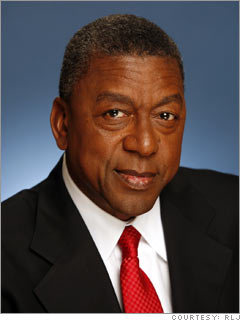BET made Robert Johnson a billionaire. Now he's out to prove a point -- and create more wealth -- with half a dozen more ventures owned and operated by African Americans.
What makes Robert L. Johnson a business contrarian? According to him it's pretty simple. "Being an African American who succeeds at the highest level," he says, "since nobody expects minorities to be there."
A lot of people might take issue with a statement like that. But the co-founder of Black Entertainment Television, the African American cable network that once named Louis Farrakhan its "man of the year," is no stranger to controversy. Over the years, BET has managed to tick off black community leaders, evangelicals, Bill O'Reilly, Spike Lee, and even Eminem. It also made Johnson one of the nation's first black billionaires and provided the seed money to launch half a dozen other ventures, from hotels to banks to an NBA team, all of which are led primarily -- if not entirely -- by black executives.
The very idea of BET made waves back in 1980. That's when Johnson, a former cable industry lobbyist, took out a $15,000 personal loan and persuaded John Malone, then CEO of Tele-Communications, to toss in $500,000 to start the channel.
"BET was a business opportunity waiting for someone to put it together," he says. It began tentatively as a couple of hours of programming on the MSG cable network, but Johnson's blend of music videos, comedy, religious shows, and college sports soon tapped an audience that had gone largely unnoticed -- and underserved -- by traditional broadcasters.
Today, BET has three spinoff channels and is piped into 78 percent of American homes. In 1991, BET became the first black-owned company listed on the New York Stock Exchange. Seven years later, Johnson bought back all the stock for a $1 billion investment. It turned out to be a shrewd move: In 2000, media giant Viacom (
VIA) picked up the network for an estimated $3 billion.
Johnson reportedly took home $1.8 billion in Viacom stock but says he's proudest of the fact that the sale also created eight multimillionaires. "I've provided a platform for a lot of African Americans on the entertainment side to become stars and a lot on the business side to become wealthy," he says.
Johnson retired from the top job at BET in 2005. Now he has a new goal: using his fame and financial clout to knock down racial barriers in as many industries as he can. First up: the hotel trade. His firm RLJ Development, founded in 2000, is the largest black-owned hotel company, with more than 100 Marriott franchises. In 2003 he snapped up the Charlotte Bobcats, an NBA expansion team, for an estimated $300 million. (Basketball legend Michael Jordan is a part owner.) And in 2006 he partnered with Harvey Weinstein to create an African American film company, OurStories.
Johnson has had his share of setbacks. Some of his projects were stillborn, such as his attempts to launch a BET clothing brand and a line of theme restaurants. Before the Bobcats, he tried and failed to buy another NBA team, the then-Charlotte Hornets. In 2000 he hoped to set up a new black-run airline, DC Air, as a spinoff of a merger between US Airways (
LCC) and United Airlines (
UAUA) that was ultimately derailed by government regulators.
But such failures are forgotten as fast as Johnson can set up new enterprises, such as his latest, RLJ Asset Management, which he says is now one of the largest black-owned private-equity operations. Much of America's wealth comes from pension funds that minorities pay into, Johnson says, "so why shouldn't minorities be actively considered the managers of that wealth?" The company's backers are almost as diverse as BET's detractors -- hip-hop star Ludacris is an investor, as are General Electric (
GE) and the Carlyle Group.
"Bob has shown tremendous commitment to developing talent in the African American community," says Carlyle Group managing director Bill Kennard. "He is absolutely fearless in pursuing his vision." His other investors, meanwhile, are seeing only one color: green. "I'm getting high fives on Wall Street," Johnson says.

